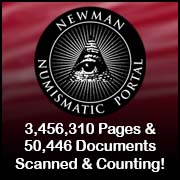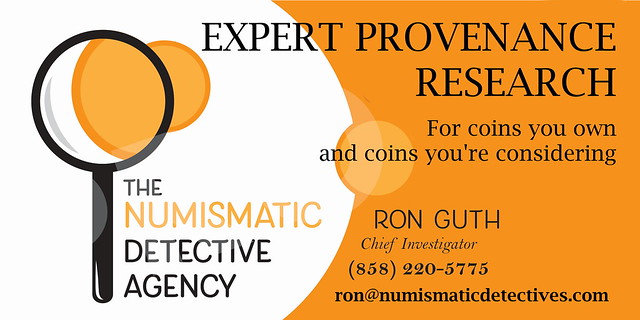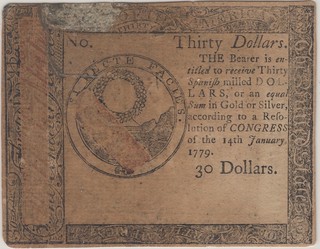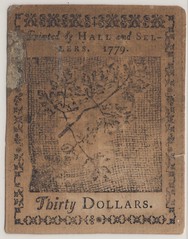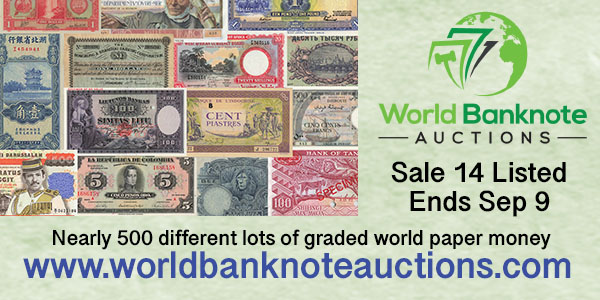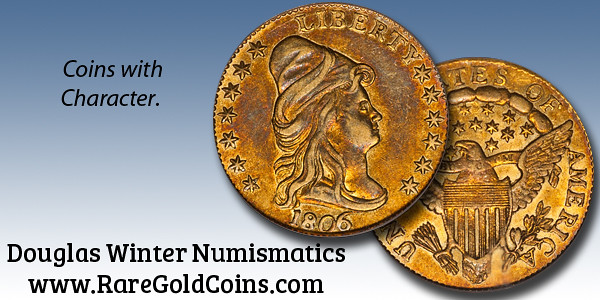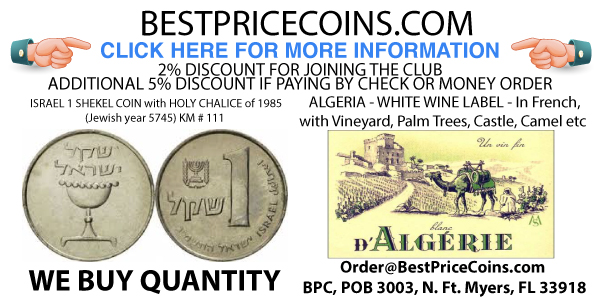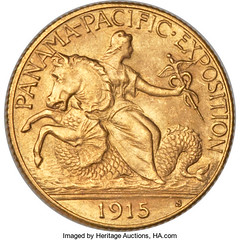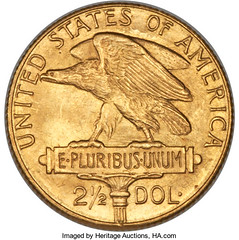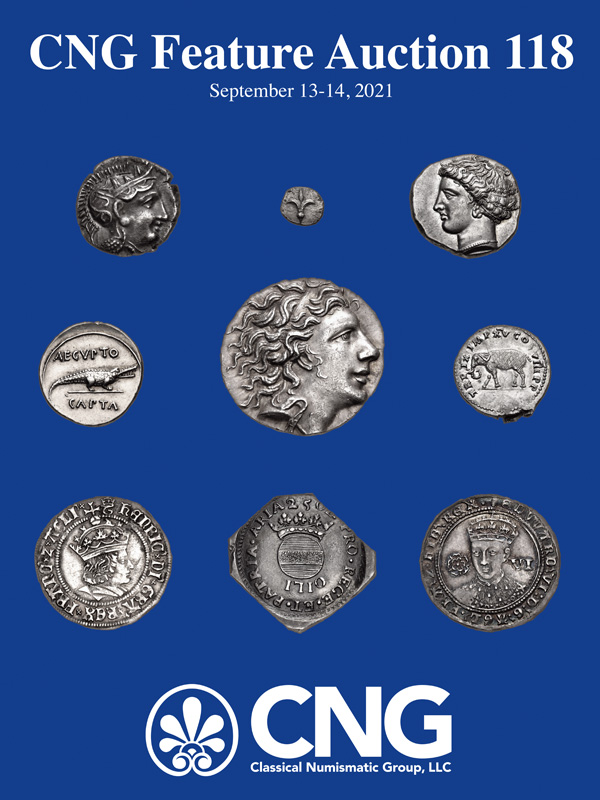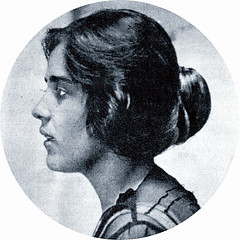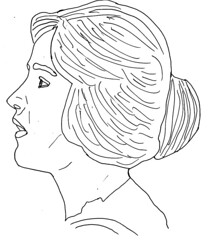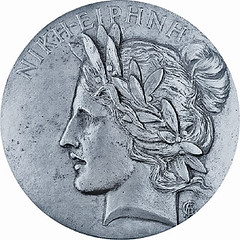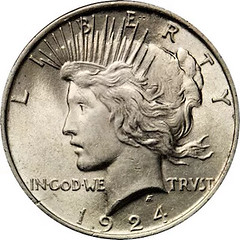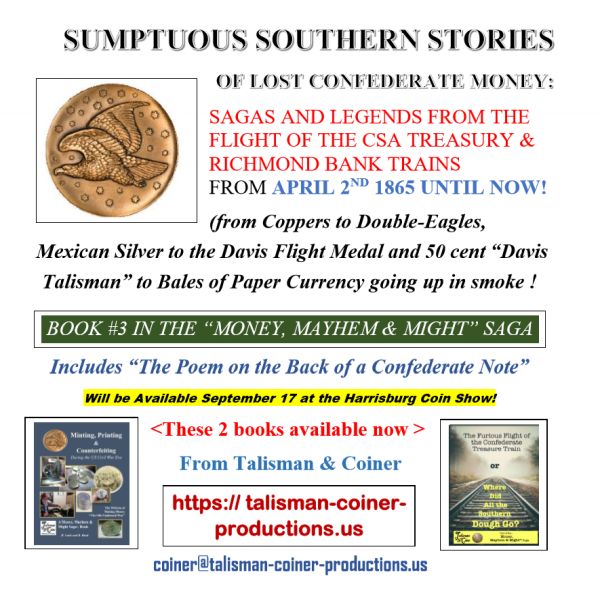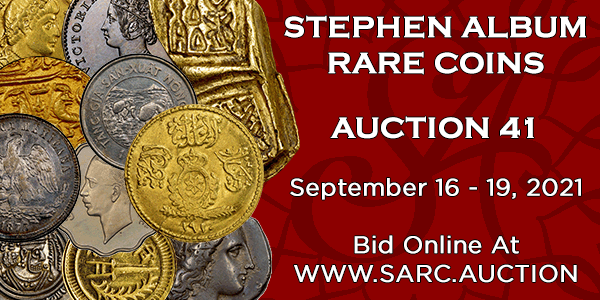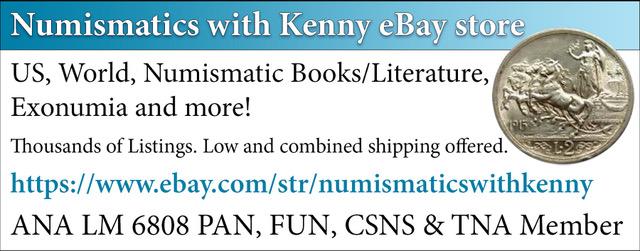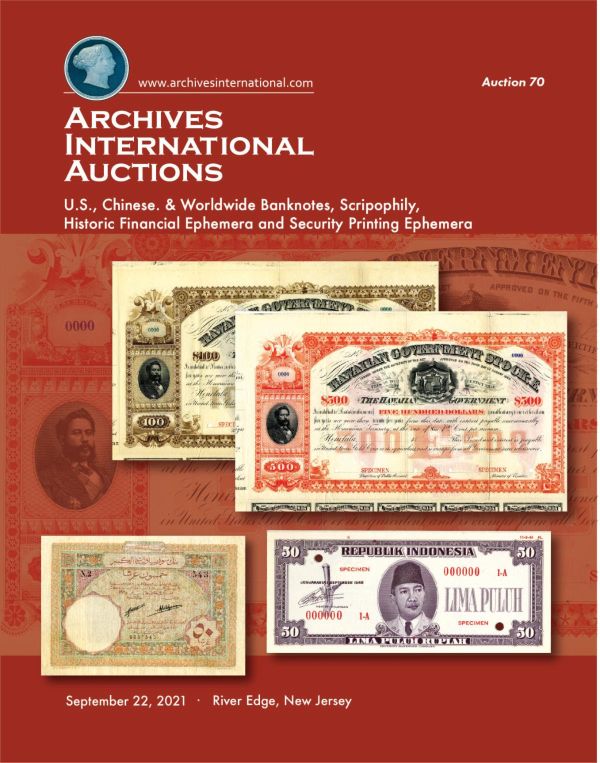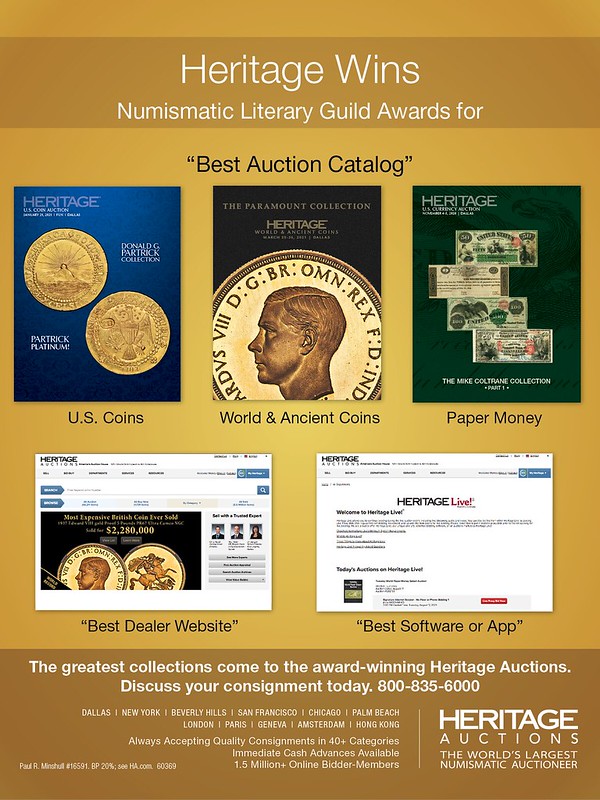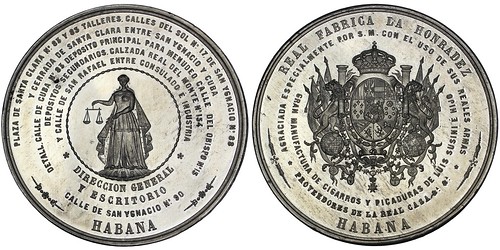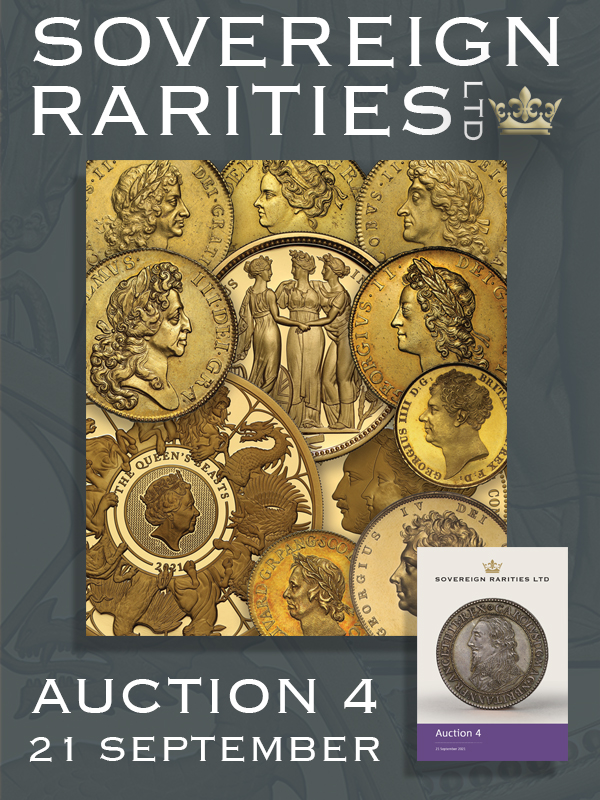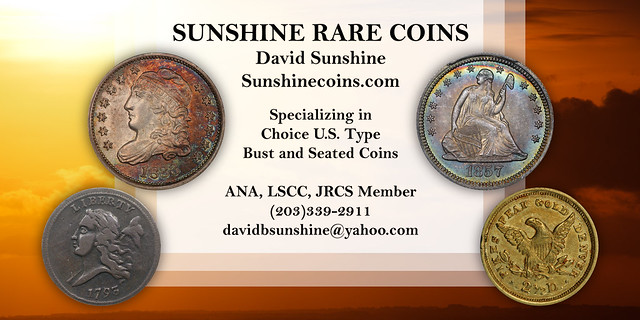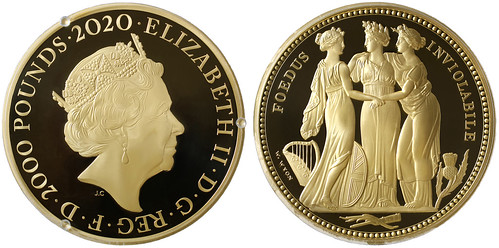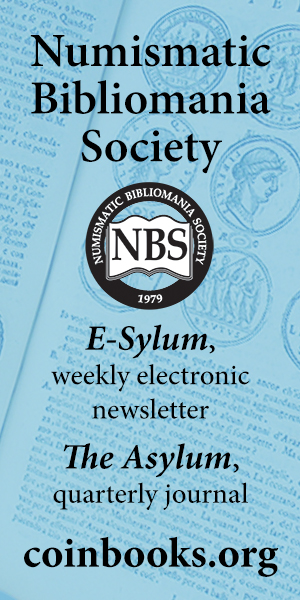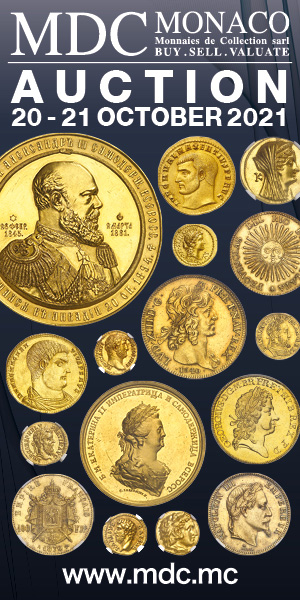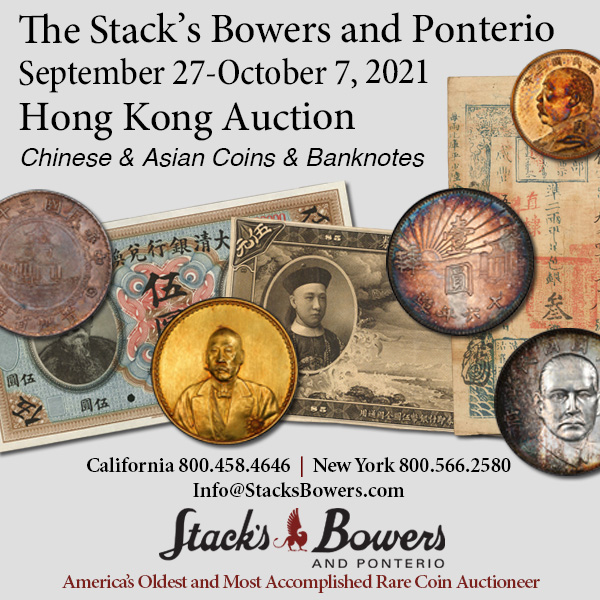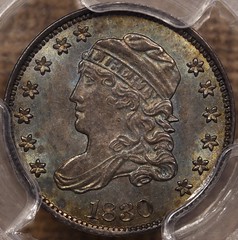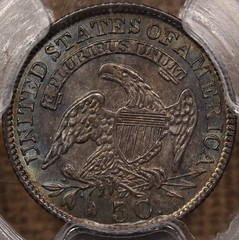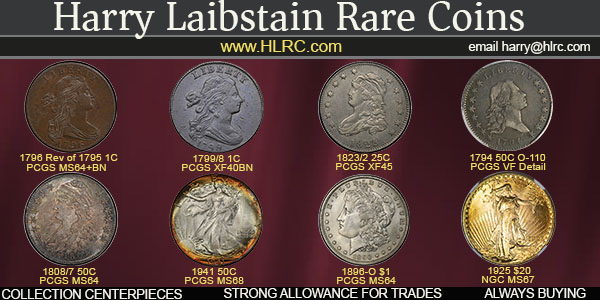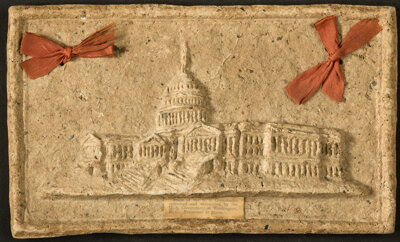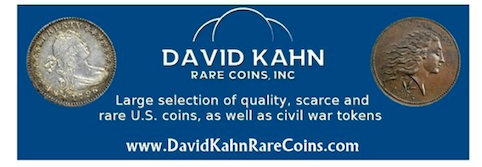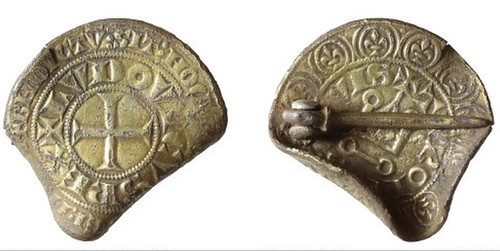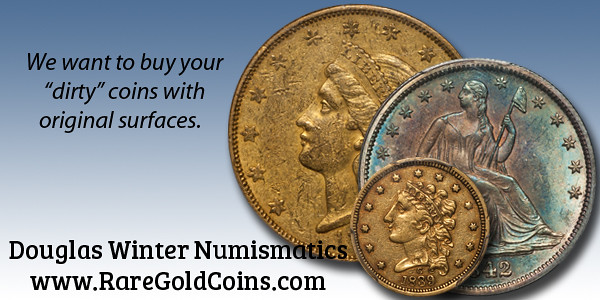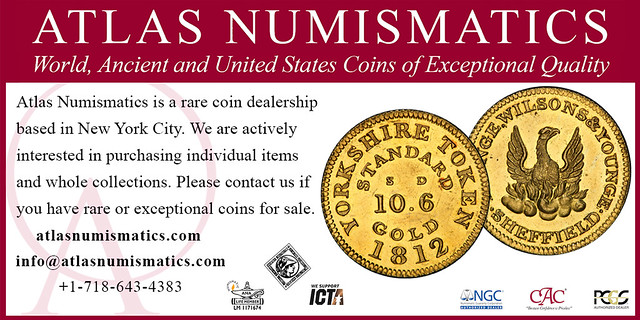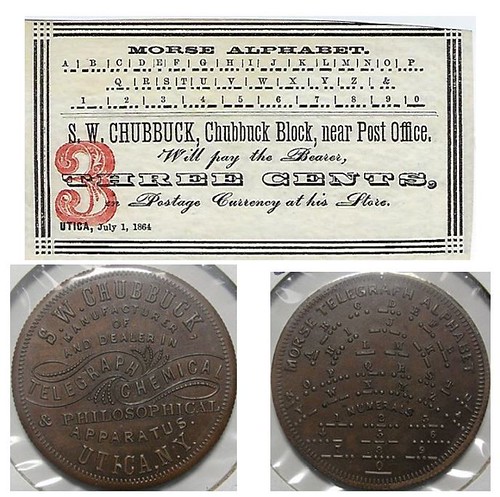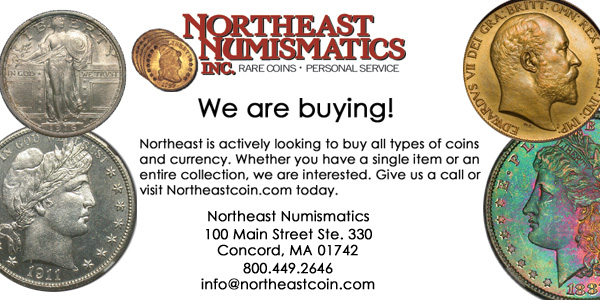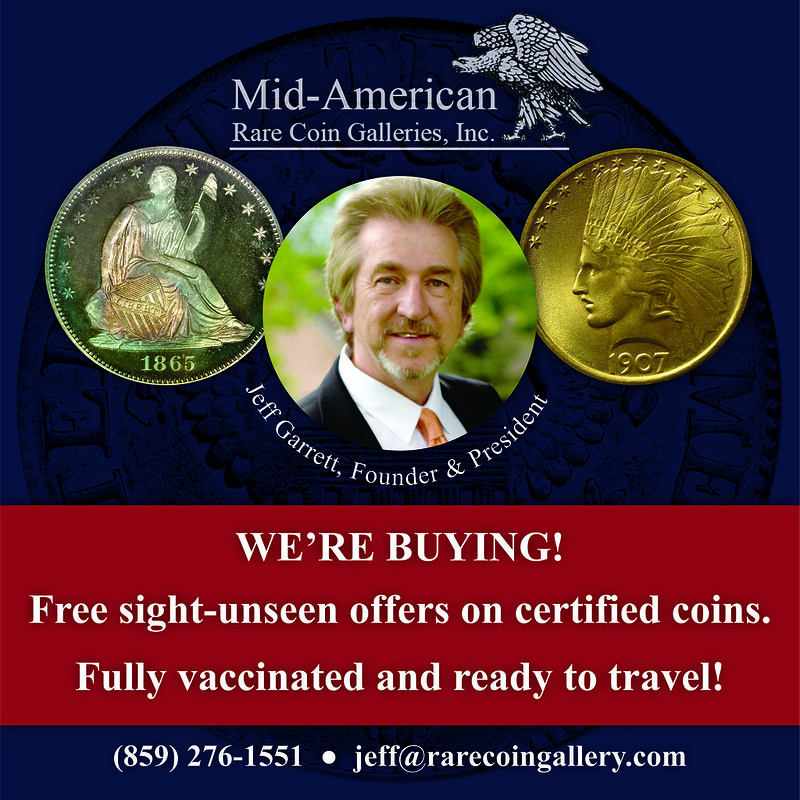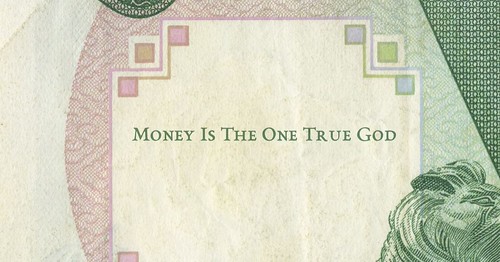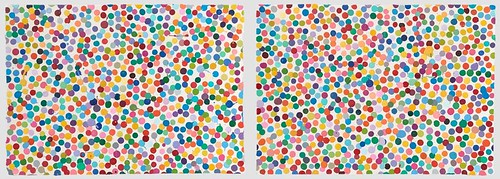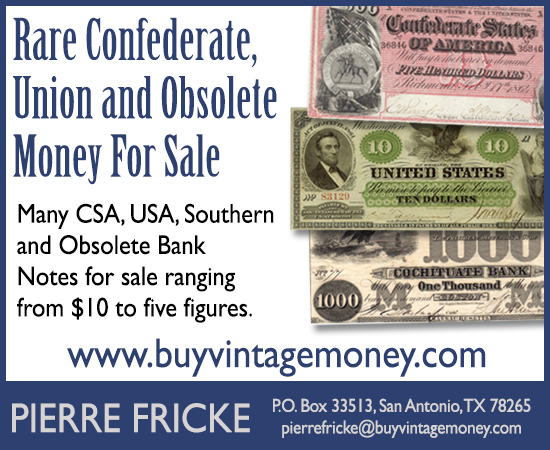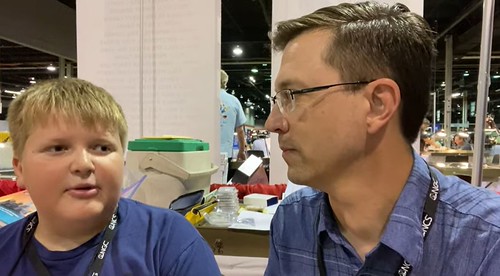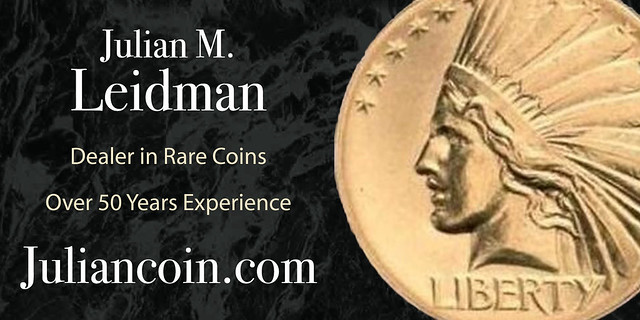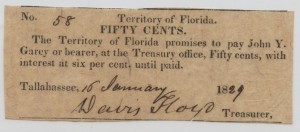
Visit our NBS Sponsors


About UsThe Numismatic Bibliomania Society is a non-profit association devoted to the study and enjoyment of numismatic literature. For more information please see our web site at coinbooks.org SubscriptionsThose wishing to become new E-Sylum subscribers (or wishing to Unsubscribe) can go to the following web page link MembershipThere is a membership application available on the web site Membership Application To join, print the application and return it with your check to the address printed on the application. Print/Digital membership is $40 to addresses in the U.S., and $60 elsewhere. A digital-only membership is available for $25. For those without web access, write to: Charles Heck, Treasurer AsylumFor Asylum mailing address changes and other membership questions, contact Chuck at this email address: treasurer@coinbooks.org SubmissionsTo submit items for publication in The E-Sylum, write to the Editor at this address: whomren@gmail.com BUY THE BOOK BEFORE THE COIN |
- WAYNE'S WORDS: THE E-SYLUM SEPTEMBER 5, 2021
- KOLBE & FANNING SALTON SALE HIGHLIGHTS
- NEW BOOK: OFFICIAL INAUGURAL MEDALS, 2ND ED.
- A CONTINENTAL DOLLAR TEST NOTE?
- VIDEO: ANTI-COUNTERFEITING FOUNDATION
- HOMREN NUMISMATIC POSTCARDS ON NNP
- MORE SHARK STOMACH COIN FINDS
- NOTES FROM E-SYLUM READERS: SEPTEMBER 5, 2021
- PROPOSAL: CADUCEUS COIN DESIGN
- QUERY: PEACE DOLLAR MODEL
- VOCABULARY TERM: FINISH AND FINISHING, PART 1
- EDWARD D. COGAN (1803-1884)
- COIN CARVER BLANCA DE LA HOZ
- CANADIAN COIN ARTIST SHEILA ORR
- COLLECTOR BUDDY EBSEN DANCES A JIG
- W.L. ORMSBY, PART THREE
- NUMISMAGRAM SELECTIONS: SEPTEMBER 2021
- STEPHEN ALBUM RARE COINS AUCTION 41
- SOVEREIGN RARITIES AUCTION 4 HIGHLIGHTS
- KUENKER AUCTION 352 SELECTIONS
- NUMISMATIC NUGGETS: SEPTEMBER 5, 2021
- THE CAPITAL COLLECTION OF MACERATED CURRENCY
- DETECTORIST FINDS GILDED FRENCH COIN BROOCH
- GOLD COINS FOUND IN FRENCH HOME RENOVATION
- NEW YORK'S FIRST CURRENCY
- S.W. CHUBBUCK AND THE BEETHOVEN EFFECT
- KA-CHING! THE ART OF ANN CARRINGTON
- VIDEO: MONEY IS THE ONE TRUE GOD
- SALES OF THE CURRENCY BY DAMIEN HIRST
- THE BIG BUSINESS OF LIBRARY E-BOOKS
- LOOSE CHANGE: SEPTEMBER 5, 2021
- FEATURED WEB SITE: HOMETOWN CURRENCY
Click here to read the thin version on the web
Click here to subscribe
Click here to access the complete archive
To comment or submit articles, reply to whomren@gmail.com
Content presented in The E-Sylum is not necessarily researched or independently fact-checked, and views expressed do not necessarily represent those of the Numismatic Bibliomania Society.
WAYNE'S WORDS: THE E-SYLUM SEPTEMBER 5, 2021
 We now have 6,679 subscribers.
We now have 6,679 subscribers.
Happy Anniversary, E-Sylum! We published our first issue 23 years ago yesterday, September 4, 1998. As it happened, that was the same day that Larry Page and Sergey Brin incorporated Google. Both events signaled a big change and two of the three of us got rich. All I got was a part time job, but it's been a fun ride. The E-Sylum has gotten bigger and better every year, and it's always fun to put together and work with this great numismatic community.
Thank you for reading The E-Sylum. If you enjoy it, please send me the email addresses of friends you think may enjoy it as well and I'll send them a subscription. Contact me at whomren@gmail.com anytime regarding your subscription, or questions, comments or suggestions about our content.
This week we open with Salton library highlights, one new book, updates from the Newman Numismatic Portal, a coin design idea, and more.
Other topics this week include a possible Continental Dollar test note, dealer Ed Cogan, collector Buddy Ebsen, coin artists Blanca de la Hoz and Sheila Orr, fixed price and auction highlights, cool coin finds, New York's first currency, and the money art of Ann Carrington and Damien Hirst.
To learn more about numismatic postcards, shark stomach coin finds, caduceus coins, W. L. Ormsby, the Chicago Motor Vehicle Company, Chinese block money and coin trees, macerated currency, the Chubbuck Telegraph Token and the Beethoven effect, read on. Have a great week, everyone!
Wayne Homren
Editor, The E-Sylum
KOLBE & FANNING SALTON SALE HIGHLIGHTS
Here are more highlights from the upcoming Kolbe & Fanning sale of the Salton library. -Editor
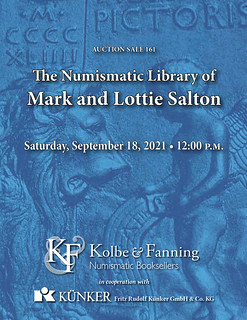 Kolbe & Fanning Numismatic Booksellers will be selling the outstanding library formed by Mark and Lottie Salton at auction on Saturday, September 18, 2021. Held in cooperation with Fritz Rudolf Künker, of Osnabrück, Germany, the 457-lot sale includes publications on ancient, medieval and modern coins from around the world, as well as important works on medals. The library's holdings of European auction catalogues, many of which are heavily annotated, are among the most significant to be offered in many years.
Kolbe & Fanning Numismatic Booksellers will be selling the outstanding library formed by Mark and Lottie Salton at auction on Saturday, September 18, 2021. Held in cooperation with Fritz Rudolf Künker, of Osnabrück, Germany, the 457-lot sale includes publications on ancient, medieval and modern coins from around the world, as well as important works on medals. The library's holdings of European auction catalogues, many of which are heavily annotated, are among the most significant to be offered in many years.
Some highlights of the sale include:
NEW BOOK: OFFICIAL INAUGURAL MEDALS, 2ND ED.
A new edition of Matthew Chiarello's book on Inaugural Medals has just been published. He provided this overview. Thanks! -Editor
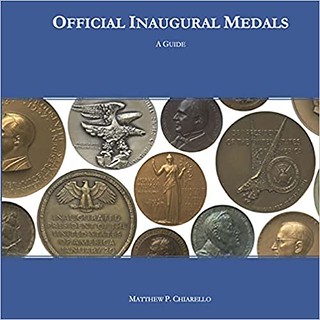 This time last year, I published a guide to official presidential inaugural medals. The original numbered hardcover edition is nearly sold out and features each of the medals through President Trump. A few months ago, I updated the guide in softcover to include the President Biden medal and a few other improvements. This is the first authoritative guide on the subject since the early 1980s.
This time last year, I published a guide to official presidential inaugural medals. The original numbered hardcover edition is nearly sold out and features each of the medals through President Trump. A few months ago, I updated the guide in softcover to include the President Biden medal and a few other improvements. This is the first authoritative guide on the subject since the early 1980s.
The book is a complete guide to official presidential and vice-presidential inaugural medals from William McKinley to Joe Biden. The updated and expanded version contains full-color images, along with a mintage and price guide for identifying medals and tracking collections. Limited hardcover first edition copies are available at Lori Ferber Presidential Collectibles. The softcover second edition is available on Amazon.
A CONTINENTAL DOLLAR TEST NOTE?
The latest addition to the Newman Numismatic Portal is an image of what may (or may not) be a Continental Dollar Test Note. Project Coordinator Len Augsburger provided the following report. Thanks. -Editor
Newman Portal contributor Bruce Vogel forwarded images of this January 14, 1779 $30 Continental Currency note, along with the following story:
At the 1996 Denver ANA I met with Eric Newman at the base of an escalator. We spoke of several early Colonial & U.S. coin subjects. In 1990, Walter Breen had given me a chemistry textbook. As a page marker, Breen used a January 14, 1779 $30 note with no signatures or serial numbers. I knew what it was but asked EPN ‘What is this?' Newman asked ‘Where did you get this? This is a test note, treat this as a test note.' You probably knew Newman, his body language: as his left shoulder dropped & his head moved to the left & downward. ‘I wish I would have known about this, I have never seen one. Where?' Me: ‘Breen used it as a bookmark.' I was afraid I was going to have to pick Newman up off the floor. ‘He had it?' That look of disbelief in his eyes. He asked for a photo, I said yes. I never sent one.
During the ANA convention, a noted authority on colonial paper viewed these images and wondered if in fact the signature had simply worn off the front of the note. The note currently resides in a PCGS About New 50 Apparent holder, with no mention of the test note attribution. We invite further discussion.
Link to NNP Edition of Early Paper Money of America:
https://nnp.wustl.edu/library/imagecollection/513468
VIDEO: ANTI-COUNTERFEITING FOUNDATION
These are selections from the David Lisot Video Library that feature news and personalities from the world of coin collecting. David has been attending coin conventions since 1972 and began videotaping in 1985. The Newman Numismatic Portal now lists all David's videos on their website at:
https://nnp.wustl.edu/library/multimediadetail/522852
Here's one on the Anti-Counterfeiting Educational Foundation. -Editor
Anti-Counterfeiting Educational Foundation Helps Dealers at TNA Coin Convention 2021.
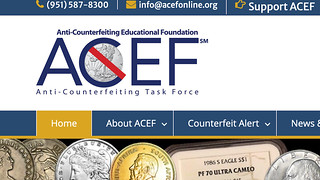 June 5, 2021. Doug Davis, Director, Anti-Counterfeiting Educational Foundation, David Lisot, Interviewer, CoinTelevision.com.
June 5, 2021. Doug Davis, Director, Anti-Counterfeiting Educational Foundation, David Lisot, Interviewer, CoinTelevision.com.
Numismatics is being plagued by major counterfeiting problem. Dealers across America are having to cope with bogus coins many originating in China. The Anti-Counterfeiting Educational Foundation has a task force to help educate dealers about the problem. Doug Davis is Director of that organization and talks about his latest efforts to combat the problem.
An excerpt of the video is available for viewing on the Coin Television YouTube Channel at:
https://youtu.be/bEyN1g5HXDU
HOMREN NUMISMATIC POSTCARDS ON NNP
Another recent addition to the Newman Numismatic Portal is my collection of numismatic postcards. There are image galleries featuring cards issued by clubs, Stack's, other dealers, and individual collectors. Other galleries cover cards with images of U.S. Mints, Bureau of Engraving and Printing and the Treasury, plus a group of cards and correspondence of St. Louis dealer G. E. Sanguinetti, c. 1940.
The cards are mostly from the 1940s through the 1980s. Many came from the holdings of James O. Sloss of Beaver, PA. I bought his numismatic library after his passing.
Many thanks to NNP summer intern Garrett Ziss who imaged the collection of some 600 pieces and wrote up all the catalog data. That was a ton of work! Here are a few selections. -Editor
MORE SHARK STOMACH COIN FINDS
Julia Casey located a couple newspaper references to coins found in the stomachs of sharks. Cool. Thanks! -Editor
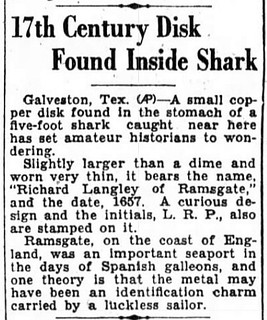 I saw the message from David Powell about the Ramsgate token found in the stomach of the shark caught off Galveston in 1931. This is the AP story about it. This is from the Wilkes-Barre Record, Oct 10 1931 but I noticed it appearing in national papers as early as August 25, 1931.
I saw the message from David Powell about the Ramsgate token found in the stomach of the shark caught off Galveston in 1931. This is the AP story about it. This is from the Wilkes-Barre Record, Oct 10 1931 but I noticed it appearing in national papers as early as August 25, 1931.
When I went to Google to look around for more information on the story - this interesting mention popped up from A View of the Coinage of Scotland (John Lindsay, 1845). page 269.
NOTES FROM E-SYLUM READERS: SEPTEMBER 5, 2021
Numismatic Scrapbook and Coin World
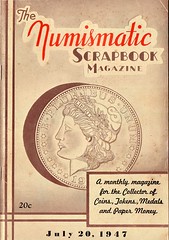 Coin World Managing Editor
Bill Gibbs writes:
Coin World Managing Editor
Bill Gibbs writes:
In reference to the following statement in last week's E-Sylum, "The magazine Numismatic Scrapbook was published from 1935 to 1976 at Chicago by printer and collector Lee Hewitt (1911-1987), please remember that the predecessor to Amos Press, publisher of Coin World, acquired Numismatic Scrapbook from Hewitt in 1968 and published it in Sidney, Ohio, until its demise in 1976."
Correct. Thanks for the clarification. -Editor
To read the earlier E-Sylum article, see:
LOOSE CHANGE: AUGUST 29, 2021 : Revisiting 1974's Top Ten Ancients
(https://www.coinbooks.org/v24/esylum_v24n35a29.html)
Other topics this week include a Muera Huerta 1 Peso note, and the Chase Manhattan "Money Tree" pamphlet. -Editor
PROPOSAL: CADUCEUS COIN DESIGN
Wayne Pearson submitted this proposal for a new coin design incorporating a caduceus. Thanks. Interesting idea. -Editor
QUERY: PEACE DOLLAR MODEL
Wayne Pearson submitted these images relating to the design of the Peace dollar. Thanks. -Editor
Here is a tracing of Teresa de Francisci, and a version of St. Gauden's Victory design.
VOCABULARY TERM: FINISH AND FINISHING, PART 1
Here's another entry from Dick Johnson's Encyclopedia of Coin and Medal Terminology. It's a biggie, so we'll split it in two parts. -Editor
Finish and Finishing. Any process that is performed to a medallic item (coins have no applied finish) after it is struck or cast; including antiquing, patinating, enameling, plating, fabricating, lacquering, edge stamping, mounting, other. At a plant that manufactures medals, other than the pressroom, the finishing department is the second largest department. Every struck piece, other than coin finish and proof surface, must pass through this finishing department for a number of processes to be applied to each piece, giving every medallic item its final color, appearance, protection and, often, its mounting.
EDWARD D. COGAN (1803-1884)
American Numismatic Biographies author Pete Smith submitted this item on early dealer Ed Cogan. Thanks! -Editor
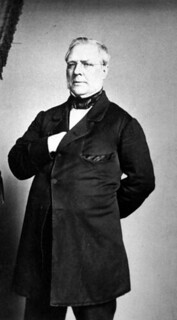 Cogan, Edward D(avid) Dealer and Cataloger (b. 1/5/1803 d. 4/7/1884)
Cogan, Edward D(avid) Dealer and Cataloger (b. 1/5/1803 d. 4/7/1884)
Born at Higham Hill, Walthamstow, Essex County, England. He emigrated to the U. S. in 1853. He was married to Louise Webb. They had eight children including George W. Cogan. Employed as a picture dealer in Philadelphia.
Cogan began in the coin business in Philadelphia in 1856. He conducted an auction of cents in 1858. The 77 lots realized $128.63. The sale was conducted through the mail, but a catalog was not printed until some time after the sale.
He issued store cards in 1859 and 1860. Moved to Brooklyn, New York, in March 1867. He conducted 69 auction sales 1858 to 1879. The Mortimer MacKenzie catalogue for the sale of June 23, 1869 was the first American auction catalogue with photographic plates. Published Table of Gold, Silver and Copper Coins, Not Issued by the United States Mint. He died in Brooklyn.
COIN CARVER BLANCA DE LA HOZ
With permission we're publishing this excerpt from Carol Bastable's article in the Fall 2021 issue of Bo Tales from the Original Hobo Nickel Society, Inc. Thanks! It's a profile of carver Blanca de la Hoz of Spain. -Editor
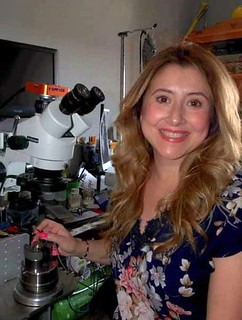 In 2012 Blanca de la Hoz found her way to hobo
nickels through her husband, Pedro Villarrubia.
Some members may remember meeting Pedro at the
2013 FUN show or reading about him in the
following Spring issue. Blanca and Pedro reside in
Spain, not too far from the capitol city of Madrid but
far enough away that it would be termed country
living. Seeing Pedro make his hobo nickels piqued
Blanca's curiosity and within a few months she was
behind the graver herself. Pedro has been her sole instructor in
learning how to carve and engrave.
In 2012 Blanca de la Hoz found her way to hobo
nickels through her husband, Pedro Villarrubia.
Some members may remember meeting Pedro at the
2013 FUN show or reading about him in the
following Spring issue. Blanca and Pedro reside in
Spain, not too far from the capitol city of Madrid but
far enough away that it would be termed country
living. Seeing Pedro make his hobo nickels piqued
Blanca's curiosity and within a few months she was
behind the graver herself. Pedro has been her sole instructor in
learning how to carve and engrave.
CANADIAN COIN ARTIST SHEILA ORR
This CBC News article interviews the Cree artist who designed a new gold coin for the Royal Canadian Mint. Here's an excerpt - see the complete article online. Orr's design shows a Cree family leaving their camp to take their pelts to the Hudson's Bay Company trading post. Thanks to Dick Hanscom for passing this along. -Editor
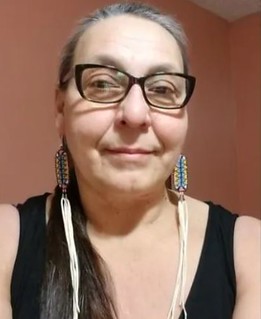 A James Bay Cree artist living in northern Saskatchewan says the gold coin she designed for the Royal Canadian Mint is a tribute to her people and the important role they played during the fur trade.
A James Bay Cree artist living in northern Saskatchewan says the gold coin she designed for the Royal Canadian Mint is a tribute to her people and the important role they played during the fur trade.
Sheila Orr, who grew up in Chisasibi, Que., about 1,700 kilometres north of Montreal, designed a collector gold coin for the Royal Canadian Mint. It's the fourth in a series called Early Canadian History.
"I was very humbled. I was very honoured to be asked to do this," said Orr, who left Quebec in the 1980s to study art and then teach fine arts at the Saskatchewan Indian Federated College in Regina. The college is now the First Nations University of Canada at the University of Regina.
THE BOOK BAZARRE
COLLECTOR BUDDY EBSEN DANCES A JIG
Over on the NGC site, Jim Bisognani wrote a tribute to his friend Keith Zaner. See the complete story online, but I wanted to excerpt this part about "Beverly Hillbillies" and "Barnaby Jones" actor Buddy Ebsen's collection. Ebsen was an old vaudeville and movie song and dance man before hopping to the small screen. -Editor
Although we didn't socialize much outside the office, we did get to know what made each of us tick. We discussed our favorite numismatic icons (Keith's was the 1822 Half Eagle), how we both got started with coins and the auction sales we had attended. I fondly recall Keith's favorite sale. It was a Superior Galleries Auction sale, held at the Century Plaza Hotel May 31-June 2, 1987, and the headline collection was that of actor Buddy Ebsen (from the Beverly Hillbillies show).
Ebsen was quite the serious collector. He even co-founded the Beverly Hills Coin Club and had amassed a significant numismatic cabinet. Keith, who was attending for Coin World as the Trends editor, described how after each coin brought a higher price than expected, or just for sheer joy, Mr. Ebsen would get up and break out a few dance moves to raucous applause and appreciation of those present. Keith said, I had to get Buddy to sign the auction catalog for me.
W.L. ORMSBY, PART THREE
Susan Bremer of Heritage published the last of a series of articles about engraver, author and publisher W.L. Ormsby. It appeared in the September 1, 2021 issue of the Heritage Currency News email. -Editor
 In this final foray into the fascinating legacy of W.L. Ormsby, we will take a deeper look at his writings, and their role in his professional downfall. Part I and II of this series introduced W.L. Ormsby, his inventions, engravings, and some of his writings. All were in service to his passionate interest in banknote engraving and its improvement to deter counterfeiting. Ormsby's dedication to the issue of counterfeiting during the 1850s-60s was unrelenting. His brash writings spurred scandal and contributed to his lasting legacy as an accused counterfeiter.
In this final foray into the fascinating legacy of W.L. Ormsby, we will take a deeper look at his writings, and their role in his professional downfall. Part I and II of this series introduced W.L. Ormsby, his inventions, engravings, and some of his writings. All were in service to his passionate interest in banknote engraving and its improvement to deter counterfeiting. Ormsby's dedication to the issue of counterfeiting during the 1850s-60s was unrelenting. His brash writings spurred scandal and contributed to his lasting legacy as an accused counterfeiter.
NUMISMAGRAM SELECTIONS: SEPTEMBER 2021
Jeremy Bostwick at Numismagram forwarded these highlights from his most recent upload of medallic art to his website. In addition to his usual selection of world art medals and plaques, there are four Russian icons that continue in the vein of attractive and artistic pieces–one of which is included in the highlights below. For all of his new items, please visit numismagram.com/inventory. -Editor
STEPHEN ALBUM RARE COINS AUCTION 41
Here's the press release for Stephen Album Rare Coins upcoming Auction 41. Some cool coins here. -Editor
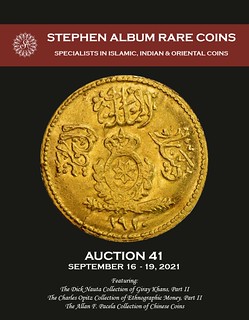 Stephen Album Rare Coins will hold its Auction 41 on September 16-19, 2021 at its offices in Santa Rosa, California. The Auction
is made up of 3,150 lots of Ancient, Islamic, Chinese, Indian, and General World Coins. Also featured in this sale is The Charles
Opitz Collection of Ethnographic Money, Part II. The final two days of the auction are internet-only sessions of lesser-priced
material. Photos of all lots are published in high resolution on the firm's website.
Stephen Album Rare Coins will hold its Auction 41 on September 16-19, 2021 at its offices in Santa Rosa, California. The Auction
is made up of 3,150 lots of Ancient, Islamic, Chinese, Indian, and General World Coins. Also featured in this sale is The Charles
Opitz Collection of Ethnographic Money, Part II. The final two days of the auction are internet-only sessions of lesser-priced
material. Photos of all lots are published in high resolution on the firm's website.
The coin featured on the cover of the printed catalog has a fascinating and important history. It is a gold dinar dating to 1920 from The Arab Kingdom of Syria. The self-proclaimed kingdom existed only a little over four months, from 8 March to 25 July 1920. During its brief existence the kingdom was led by Sharif Hussein bin Ali's son Faisal bin Hussein. Despite its claims to the territory of Greater Syria, Faisal's government controlled a limited area and was dependent on Britain which, along with France, generally opposed the idea of a Greater Syria and refused to recognize the kingdom. The kingdom surrendered to French forces on 25 July 1920. Faisal then lived in exile in England for about one year before being proclaimed King of Iraq.
SOVEREIGN RARITIES AUCTION 4 HIGHLIGHTS
Sovereign Rarities will hold their fourth auction latest this month. Here's the press release. -Editor
Sovereign Rarities are pleased to present to the numismatic community their fourth auction - taking place on the 21st September 2021 - consisting of 320 lots of Hammered, Milled and Modern British and World Coins. The sale features many choice British and world coins, and the pre-bidding phase is open now at www.sovr.co.uk until the live auction on the day.
KUENKER AUCTION 352 SELECTIONS
Here are some pieces that caught my eye in the upcoming Künker sale, found among highlights of the Hermann Schwarz Collection of world gold coins. -Editor
This is one of the best moments in the life of any coin dealer: being able to offer a collection that has remained untouched for two generations. Hermann Schwarz (1880-1961), owner of the oldest Bavarian publishing house specialized in forms, had witnessed the period of hyperinflation after the First World War and learned from it to always invest a considerable part of his fortune in gold coins. In Auction 352, we have the pleasure to offer you these gold coins, which Schwarz mostly acquired from Munich coin dealers.
You can look forward to an impressive ensemble. The spectrum ranges from ancient coins, which will be on sale on Saturday, 25 September following Auction 351, to impressive rarities from all over the world, on sale on Monday, 27 September, to issues of the German States and coins of the German Empire on 27 and 28 September. As is the case with many good old collections, connoisseurs will find rarities of the finest quality alongside more common pieces of very fine
quality. Accordingly, estimates range from prices just above the material value to five-digit figures.
NUMISMATIC NUGGETS: SEPTEMBER 5, 2021
Here's a selection of interesting or unusual items I came across in the marketplace this week. Tell us what you think of some of these. -Editor
GOLD CAC approved! A stunning, magnificent coin, that also happens to be the finest known of a rare die variety. This coin was previously contained in a PCGS MS66 holder, and it was Green CAC'd at that grade. The pictures only hint at the incredible color, originality and eye appeal here. Trust me, this coin is breathtaking.
A great coin in the stock of David Kahn Rare Coins. -Editor
To read the complete lot description, see:
1830 LM-6 R4 Capped Bust Half Dime PCGS MS64+ GOLD CAC, Probable Finest Known
(https://www.davidkahnrarecoins.com/catalog/product/view/id/2518/s/1830-h10c-capped-bust-half-dime-pcgs-ms64-cac-gold-111197317)
Other topics this week include the Chubbuck Telegraph Token, a Civil War Soldier Washington ID Dog Tag and a WWI Japanese Hospitals in France medal. -Editor
THE CAPITAL COLLECTION OF MACERATED CURRENCY
The September 1, 2021 issue of the Heritage Currency News email discussed the firm's upcoming sale of the Capital Collection of macerated currency. -Editor
Heritage has been honored to auction many impressive collections of well-known numismatists over the years, but few are both as unusual and impressive as The Capital Collection of Macerated Currency. This offering showcases the combined macerated collections of Heritage's own Len Glazer and of the estate of well-regarded Rhode Island numismatist Wade Boughton.
DETECTORIST FINDS GILDED FRENCH COIN BROOCH
Coins have been made into jewelry and other useful objects for centuries. A metal detectorist recently uncovered a gilded brooch made with a French coin. -Editor
A man who has unearthed hundreds of artefacts in 40 years of metal-detecting says he dreams of finding "something that changes history".
His latest find, a gilded silver medieval brooch made from a French coin, has been declared treasure.
GOLD COINS FOUND IN FRENCH HOME RENOVATION
Not all great coin finds require a metal detector. -Editor
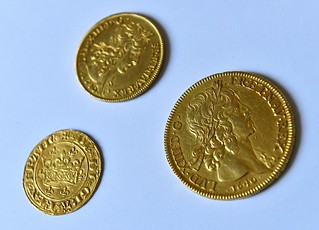 Hundreds of rare gold coins found in the walls of a remote French mansion go under the hammer this month, the auction house tasked with selling the treasure said on Thursday.
Hundreds of rare gold coins found in the walls of a remote French mansion go under the hammer this month, the auction house tasked with selling the treasure said on Thursday.
The 239 coins, minted before the French Revolution during the reigns of Louis XIII and Louis XIV, were discovered when the owners of the mansion near Quimper in the western Brittany region hired stonemasons to unite the three buildings of their property, auctioneers Ivoire said.
During the work, three craftspeople found a metal box filled with gold coins in a wall.
"The box was embedded in the wall, stuck between stones," the mansion's owner, Francois Mion, told AFP.
NEW YORK'S FIRST CURRENCY
Pablo Hoffman of New York City passed along this Gothamist article about New York's first currency. Thanks. -Editor
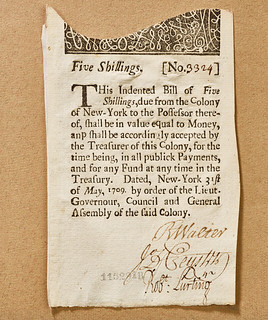 William Bradford, New York's first printer, arrived in the North American colonies in November 1685 at the age of 22. Settling initially in Pennsylvania, he established a printing shop in Oxford, near Philadelphia, where he plied his trade for the next seven years. After repeatedly running afoul of the Quaker authorities, however, he was invited by the Province of New York to come to the colony to establish its first public printing press. He arrived in Manhattan in 1693, opening his new business at what is now 81 Pearl Street (today, a bar and grill). His was the only press in New York until 1726, when his former apprentice, John Peter Zenger, established his own printing firm.
William Bradford, New York's first printer, arrived in the North American colonies in November 1685 at the age of 22. Settling initially in Pennsylvania, he established a printing shop in Oxford, near Philadelphia, where he plied his trade for the next seven years. After repeatedly running afoul of the Quaker authorities, however, he was invited by the Province of New York to come to the colony to establish its first public printing press. He arrived in Manhattan in 1693, opening his new business at what is now 81 Pearl Street (today, a bar and grill). His was the only press in New York until 1726, when his former apprentice, John Peter Zenger, established his own printing firm.
During his long years in business, Bradford was responsible for many printing milestones in New York, including publishing the colony's first book (1693), legal statutes (1694), newspaper (1725) and map (1731). The New York Public Library holds copies of all the aforementioned items, along with the first paper money circulated in the colony, indented bills dating from 1709, also printed by Bradford.
The term indented bill
derives from the stub cut from each note, which left an irregular, wavy edge. Provided it fit the corresponding stub kept on file by the government, such bills could be redeemed by the holder for coin in the amount of the stated denomination. New York was only the third colony to issue paper currency, following Massachusetts in 1690 and South Carolina in 1703.
S.W. CHUBBUCK AND THE BEETHOVEN EFFECT
The September 2021 issue of Nena News from the New England Numismatic Association has a nice article by C. John Ferreri on a topic we've discussed earlier - the interesting scrip notes issued by S.W. Chubbuck. With permission, we're republishing it here. Thanks! -Editor
KA-CHING! THE ART OF ANN CARRINGTON
Ed Hohertz passed along this SPINK catalogue of works by artist Ann Carrington, many of which have numismatic themes. Thanks! -Editor
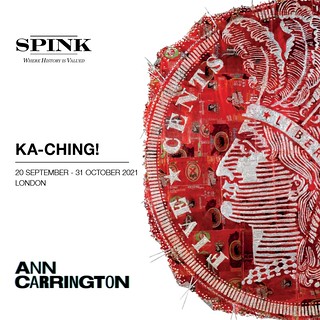 From the Foreword by SPINK Chairman and CEO Olivier D. Stocker:
From the Foreword by SPINK Chairman and CEO Olivier D. Stocker:
"When I was first shown the images of Ann's stamp and coin works, I immediately felt there was a symbiosis between Spink and her renditions of Machin's stamp portraits and the Indian Head coin. On further investigation of some of Ann's other works and discovering the intricate work involved and the materials employed, I was determined to hold this major exhibition at our 69 Southampton Row premises. This catalogue represents the body of Ann's pieces to be included in the forthcoming exhibition."
VIDEO: MONEY IS THE ONE TRUE GOD
Here's a great video animation using banknotes. Check it out. -Editor
Director and animator lachlan turczan has created a stunning video animation in collaboration with musician blake mills. titled ‘money is the one true god', the six-minute-long music video has been made using imagery on banknotes from over 23 countries. The project takes viewers on a kaleidoscopic journey through the repeated motifs and iconic imagery on these bills, which reveal what humans have valued over time. The age of exploration leads to industrialization, wonders of the world are replaced by office buildings, and icons of freedom stand in stark contrast to images of slavery. The animation culminates with the collective eyes of all world leaders staring back at the audience.
‘Money is the one true god' first began as a covid lockdown passion project. Lachlan turczan explains the process, ‘I made hi-resolution scans of banknotes from 23 countries around the world. I used machine learning to further enhance these scans so that I could zoom in on the intricacies of the engravings. using replacement animation techniques, the guilloché patterns wash over the viewer in a barrage of visual rhythms.'
SALES OF THE CURRENCY BY DAMIEN HIRST
Here's a follow-up article looking at the aftermarket for Damien Hirst's latest project, The Currency. J.S.G. Boggs would have loved this. -Editor
These two Damien Hirst ‘Currency' works sold within a hour of each other. ‘5083. Yeah, come on for a ride', left, sold for US$45,966. ‘6307. We shall bring our own children', right, sold for US$26,285.
Hirst's latest art project, called The Currency, comprises 10,000 A4 sized pieces of handmade paper covered in very similar but not identical coloured spots. The back of each is numbered and signed by the artist with an arty title. Like actual contemporary bank notes, each also has a watermark, a microdot and a hologram to make it hard to forge.
The interesting twist is that Hirst has made this into an interesting experiment in the highly irrational economics of collectibles and blockchain technology.
THE BIG BUSINESS OF LIBRARY E-BOOKS
Bibliophiles may enjoy this New Yorker piece on the business model of library e-books. Is e-lending coming to numismatic literature? -Editor
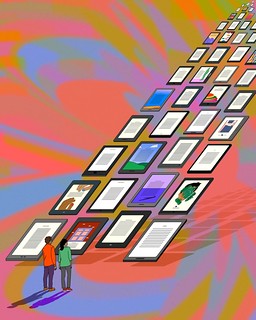 For the most part, publishers do not sell their e-books or audiobooks to libraries—they sell digital distribution rights to third-party venders, such as OverDrive, and people like Steve Potash sell lending rights to libraries. These rights often have an expiration date, and they make library e-books
For the most part, publishers do not sell their e-books or audiobooks to libraries—they sell digital distribution rights to third-party venders, such as OverDrive, and people like Steve Potash sell lending rights to libraries. These rights often have an expiration date, and they make library e-books a lot more expensive, in general, than print books,
Michelle Jeske, who oversees Denver's public-library system, told me. Digital content gives publishers more power over prices, because it allows them to treat libraries differently than they treat other kinds of buyers. Last year, the Denver Public Library increased its digital checkouts by more than sixty per cent, to 2.3 million, and spent about a third of its collections budget on digital content, up from twenty per cent the year before.
THE BOOK BAZARRE
LOOSE CHANGE: SEPTEMBER 5, 2021
Here are some additional items in the media this week that may be of interest. -Editor
Aaron Oppenheim forwarded this YouTube video of conversations with young numismatists at recent ANA World's Fair of Money. Thanks. Lots of comments to read as well. -Editor
To watch the video, see:
The Future of the Coin Collecting Hobby - Conversations with Young Numismatists at ANA Coin Show
(https://www.youtube.com/watch?v=M_DTtZRUCnc)
Other topics this week include the Lincoln Cent rollout, and the money-eating termites. -Editor
FEATURED WEB SITE: HOMETOWN CURRENCY
This week's Featured Web Site is the Hometown Currency Virtual Museum. Found via News & Notes from the Society of Paper Money Collectors (Volume VII, Number 7, August 3, 2021).
Hometown Currency explores the history of Florida Currency in a museum and research role breaking down currency by city and by bank. It also provides great reference to news articles, historical pictures, and intuitive videos for users of all ages to learn and enjoy.

